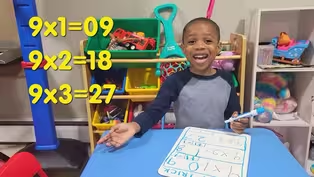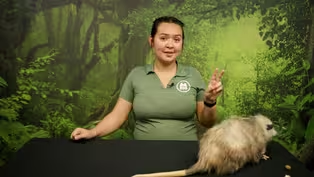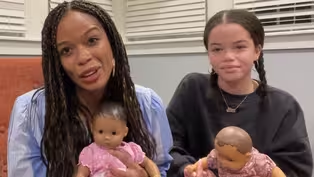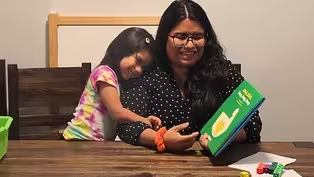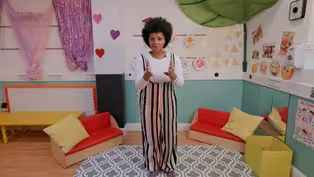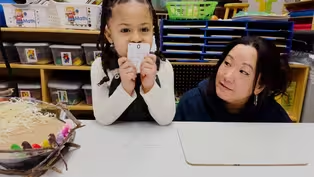
E PARTY!
Clip: 5/5/2023 | 11m 30sVideo has Audio Description
Isabel Simmons explores how an e at the end of a word makes a middle e sound long.
Isabel Simmons has an e party. She demonstrates how an e at the end of a word turns the e in the middle of the word into a long vowel sound. Isabel prompts viewers to practice reading, decoding, and writing words with two e letters like these, theme, and Pete.
See all videos with Audio DescriptionADProblems playing video? | Closed Captioning Feedback
Problems playing video? | Closed Captioning Feedback
Let's Learn is a local public television program presented by THIRTEEN PBS

E PARTY!
Clip: 5/5/2023 | 11m 30sVideo has Audio Description
Isabel Simmons has an e party. She demonstrates how an e at the end of a word turns the e in the middle of the word into a long vowel sound. Isabel prompts viewers to practice reading, decoding, and writing words with two e letters like these, theme, and Pete.
See all videos with Audio DescriptionADProblems playing video? | Closed Captioning Feedback
How to Watch Let's Learn
Let's Learn is available to stream on pbs.org and the free PBS App, available on iPhone, Apple TV, Android TV, Android smartphones, Amazon Fire TV, Amazon Fire Tablet, Roku, Samsung Smart TV, and Vizio.
Providing Support for PBS.org
Learn Moreabout PBS online sponsorship[bright music] [energetic music] - Hi, friends, it's Isabel, and welcome to my home.
Today, we are having an E party.
Get it.
We are going to be learning about how the E at the end of the word can help an E say "eee," its long sound.
Are you ready to see how the E can help the E say "eee"?
[children cheer] Great!
Let's get started with a phonemic awareness activity.
Today, we're going to play The Rollercoaster Game.
In The Rollercoaster Game, we're going to listen very closely for the sound that the E is making in words.
We're going to listen for the sounds eee, the long sound, or eh, the short sound.
If you hear eee, the long sound, I want you to hold your thumb up like this, and if you hear eh, the short sound, today, I want you to hold your thumb down like this.
Eee.
Eh.
Eee.
Eh.
Are you ready?
Great.
The first word today is seat.
Can you say that word?
Let's take it on a rollercoaster.
Seat.
Do you hear eee or eh?
That's right.
You heard the eee.
Let's try that again.
The next word is set.
Can you say that word?
Let's take it on a rollercoaster ride.
Set.
Huh?
Mm?
Mmm.
Good job.
The next word is feet.
Take it on a rollercoaster.
Feet.
Great job.
You're doing really good at this.
Have you played this game before?
Let's try another word.
The next word is meat.
Meat.
That's right.
Last one.
Mess.
Take it on a rollercoaster.
Mess.
Good job.
Now you're ready to build some words with me.
[children cheer] Hi, friends.
We're back and we're ready to build some words.
I started with one word here.
This word has everything we already know.
I know that the P says "puh," the E says "eh," the T says "tuh," so If I said peh-teh, what would the word be?
Pet.
Like a cat.
Right?
Now, I have an extra E here.
Let's see what happens when I add the E to the end of this word, I know that this E that comes at the end is silent, shh, and it's telling this E to say its long sound of eee, right?
So, what would this new word be?
Puh-eee-teh.
Pete.
Pete.
Hmm.
But Pete is a name, right?
So, should this be a lowercase P?
Absolutely not.
We've got to change it.
Now this makes sense.
What's this word again?
Pete.
It's a name.
Let's try another word together.
Do you know what this word says already?
You are so smart.
[kisses] I love it.
Meh-tuh.
Met.
Now, if I add the E to the end, mee-tuh.
Mete.
Mete.
But that's not the meat I'm used to like ham or turkey.
This mete means to give out something, like Superman metes out justice.
Mete.
Okay, let's try one more.
Let's see.
What could we do here?
T. Hmm.
Do you know what this says?
I see a blend at the beginning.
Stuh.
Eve.
Steve.
That's a name, too.
Can I use a lowercase letter at the beginning of a name?
No.
I have to change it to an uppercase letter.
That makes more sense.
What does this say?
Great job.
Now we're ready to read some words together.
You're going to see three lines of words.
I want you to look at each line before we read it.
You're going to read it out loud and I'm going to read it silently.
I want you to think, what do you notice before you begin to read?
Let's look at the first line.
That's right.
I see the silent E at the end of each of these words, so I know that the E that comes before the silent E is going to say its long sound.
That's right.
It's going to say, "Eee."
Okay, are you ready?
Let's go.
Eve.
Steve.
Pete.
Mete.
Excellent.
Now, let's look at the second line.
I don't see any silent Es at the end of the word, so I know that the E inside of these words are going to say... "Eh," that's right.
It's going to say its short sound.
Are you ready?
Nest.
Pest.
West.
Fest, like a party, an E party.
Now we're up to our third and last line.
What do you notice about these words?
Some have the silent E at the end and some don't.
Let's see how we do.
These.
Them.
Theme.
Did you see how that's a thuh?
Then.
Theme is a big idea in books.
Great job reading.
Now we're ready to take everything we've learned and read our sentence.
These cats are so happy.
[claps] You did such a great job.
Now we're going to take everything that we've learned about the E at the end of the word that helps the E before it to say its name or long sound to write one word together.
Are you guys ready?
Good.
Grab yourself a pen or something to write with and a piece of paper or something to write on and meet me right back here.
[bright music] Welcome back, friends.
Are you ready?
[children cheer] That's great.
The word of the day is mete.
Superman will mete out justice.
Mete.
Let's tap that out together.
Mmm-eee-tuh.
Okay, are you ready to write it?
Go ahead.
- [Supportive Person] Woo!
- Yes.
Did you write this?
Mmm eee tuh.
[gasps] It's silent.
Good job.
We've done so many great things with our silent E that helps the E say its long sound of eee today, and I hope you practice listening for the sounds that our vowels make in words using The Rollercoaster Game.
And until next time.
See you soon, friends.
AYANFEOLUWA SHOWS SOME MATH TRICKS!
Video has Audio Description
Clip: 5/5/2023 | 1m 13s | Ayanfeoluwa shows some math tricks! (1m 13s)
Video has Audio Description
Clip: 5/5/2023 | 6m 5s | Jo Olson talks about animal babies at the Memphis Zoo. (6m 5s)
Video has Audio Description
Clip: 5/5/2023 | 9m 2s | Maria Begg-Roberson and her daughter explore how adults care for babies. (9m 2s)
CHICK, CHICK, PEEP, PEEP, PEEP
Video has Audio Description
Clip: 5/5/2023 | 10m 7s | Katherine Rodriguez reads CHICK, CHICK, PEEP, PEEP, PEEP by Xiao Mao. (10m 7s)
Video has Audio Description
Clip: 5/5/2023 | 9m 27s | Diane Sanlatte teaches the Spanish song “Mi Cuerpo.” (9m 27s)
SUBTRACTING FROM 10 WITH BABY BIRDS
Video has Audio Description
Clip: 5/5/2023 | 6m 52s | Zoe Kleinmann and two students subtract from 10 using toy baby birds in a nest. (6m 52s)
Providing Support for PBS.org
Learn Moreabout PBS online sponsorship

- News and Public Affairs

Top journalists deliver compelling original analysis of the hour's headlines.












Support for PBS provided by:
Let's Learn is a local public television program presented by THIRTEEN PBS
